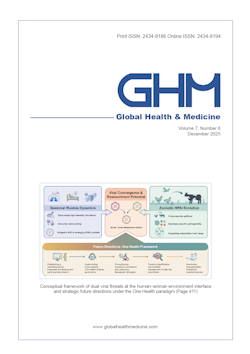Global Health & Medicine 2024;6(6):363-374.
Adverse reactions to mRNA COVID-19 vaccine in people with allergies in Japan
Shoji N, Ito S, Nojiri S, Urasaki W, Nara T, Okuzawa A, Tobita M
mRNA vaccines emerged as a new therapeutic modality during the COVID-19 pandemic. Individuals with allergies often experience anxiety about potential adverse reactions to these vaccines. This study aims to elucidate the relationship between adverse reactions and various allergies, asthma, or atopic disorders. Data from approximately 20,000 Japanese healthcare workers participating in a prospective cohort study were analyzed. The number of vaccinated individuals was 19,792 (first dose), with systemic reactions occurring in 35.8% after the first dose and 75.3% after the second dose. Participants with allergies were categorized into groups: food and/or drug allergies (n = 806), asthma and/or atopic disorders (n = 2,370), asthma (both past medical history [PMH] and present illness [PI]) (n = 1,983), and atopic disorders (PI) (n = 567). Most systemic reactions in those with food and/or drug allergies occurred within the first three days of vaccination. Logistic regression analysis showed that food and/or drug allergies, asthma (PMH and PI), and asthma and/or atopic disorders were significantly associated with systemic reactions (odds ratios [95% confidence interval]: 1.65 [1.43-1.91], 1.36 [1.23-1.49], and 1.32 [1.21-1.45], respectively, for the first dose). These findings suggest the risk of systemic reactions after COVID-19 vaccination in individuals with the specified allergies, potentially contributing to vaccine hesitancy. Medical professionals should clearly communicate the risks and benefits of vaccination to those with allergies to alleviate their concerns. Additionally, our study's data may be useful for making decisions whether or not to get vaccinated in those with allergies and inform the development of future mRNA vaccines.
DOI: 10.35772/ghm.2024.01053







